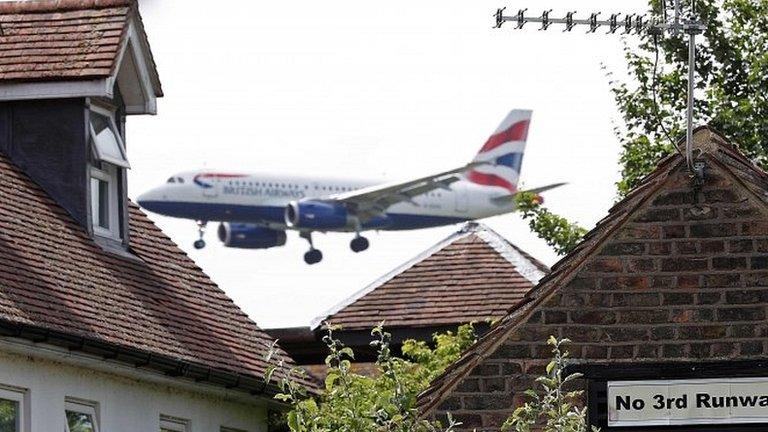Does the Midlands still need its own major airport?
- Published
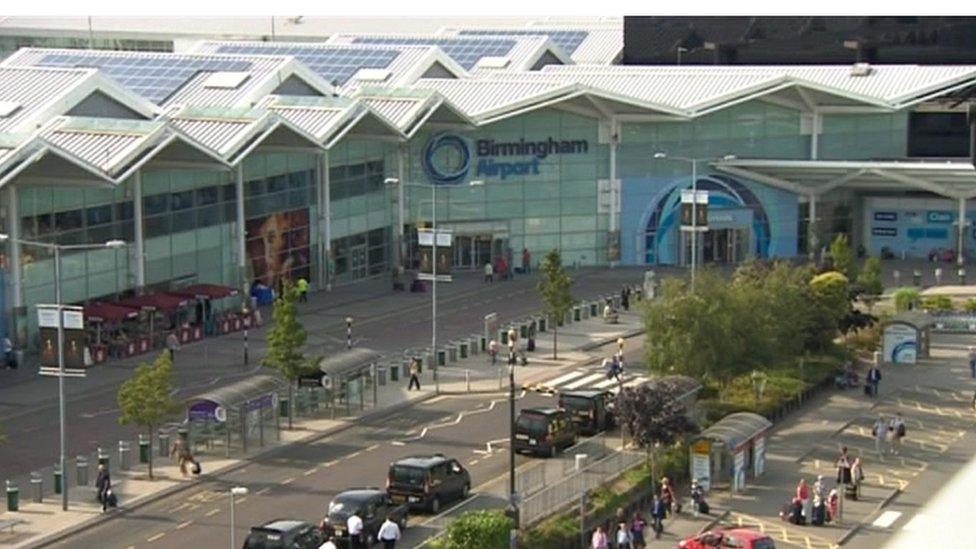
Birmingham Airport is the UK's third largest airport outside London and the seventh largest overall
"The flyover region"
It's an expression coined by the former Conservative minister Lord (formerly David) Willets, now Executive Chair of the Resolution Foundation. He was adapting the American catchphrase, "the flyover state".
It describes those predominantly "rust belt" or "red neck" areas languishing between the wealthy US east and west coasts, where the key decision-makers and business executives, in their high-flying jets, no longer touch down.
Lord Willetts was born and educated in Birmingham so his warning for regions like ours has a special resonance. Are there really parts of Britain which are equally at risk of being economically and politically over-flown?
Ministers, including the Transport Secretary Chris Grayling, present Heathrow's third runway as the answer to this: about 15% of the extra slots will be reserved for domestic flights connecting the regions with that 'global hub'. Managers at many regional airports agree.
So why were nine of our local MPs among over 100 Labour members who voted against Heathrow's third runway? Ian Austin, Liam Byrne, Jim Cunningham, Preet Gill, Roger Godsiff, Emma Reynolds, Valerie Vaz, Tom Watson and Mat Western all opposed it. But they failed to prevent it gaining an overwhelming majority.
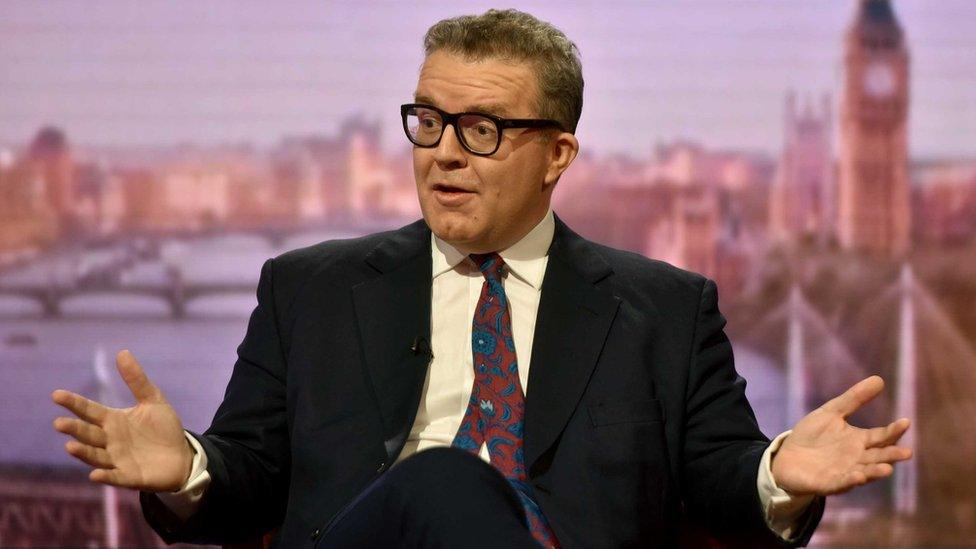
Tom Watson was among those who voted against Heathrow's third runway
Birmingham's relative proximity to London's airports means Mr Grayling's regional incentives have little attraction in the Midlands. Local feeder flights to London were never more than niche operations and disappeared altogether 30 years ago.
In their millions, Midlanders and overseas visitors alike have been prepared to use surface transport to begin or end their journeys via Heathrow. Mr Grayling points out that using HS2 to connect through to Heathrow should make this easier still.
The general emphasis on high-speed rail driving London's economic energy towards the regions tends to understate the truism that railways go both ways!
Mr Grayling himself has admitted that, unlike those other regional airports, Birmingham could face "greater competitive pressure" from an enlarged Heathrow.
Could Birmingham Airport's ambition to develop its own long haul markets far beyond the traditional 'bucket and spade' and short haul markets be thrown into reverse? Would it really matter if they were?
Eggs in one basket
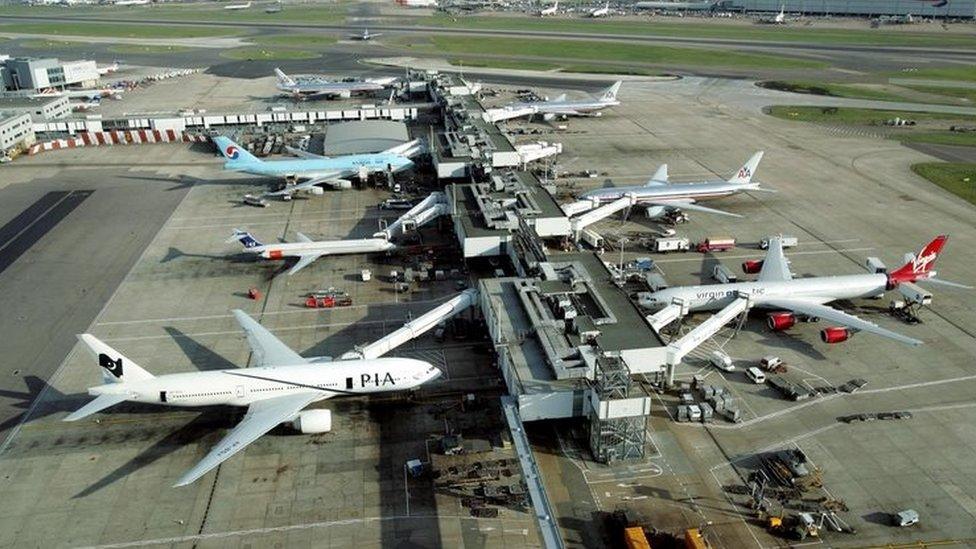
Transport Secretary Chris Grayling has said enlarging Heathrow will create 100,000 new jobs
Three years ago the airport's then CEO Paul Kehoe formed a double act with his Gatwick counterpart, doing the rounds of the political party conferences, urging decision makers not to put all their eggs in one basket marked "Heathrow".
In the run-up to Monday night's vote, the former Transport Secretary, Justine Greening wrote to Midlands MPs urging them to oppose Heathrow's third runway. This may have something to do with the fact that her Putney constituency lies directly beneath one of Heathrow's main flight paths.
But that doesn't explain-away one of the main themes of her letter: Transport Select Committee analysis suggests Birmingham Airport could lose over 17,000 flights by 2030 if Heathrow's third runway goes ahead.
Ms Greening's other big point is that global aviation markets are moving away from the traditional hub model favoured by legacy airlines like U.S. carriers such as United and American as well as, yes, our own British Airways.
New kids on the block including Norwegian, jetBlue and Air Asia are transforming long haul flying by using new generation aircraft including Boeing's Dreamliner and Airbus's A350 to fly great distances direct from A to B rather than via intermediate hubs like Heathrow.
LHR3+HS2=BH-eXit?
Take this argument through to its logical, or illogical, conclusion and you may even ask if our region would still need an international airport of its own.
Many local people, especially those living within earshot of it, may be understandably relieved to see its wings clipped. Does it matter if the vast majority of transport investment continues to be pumped into southeast England?
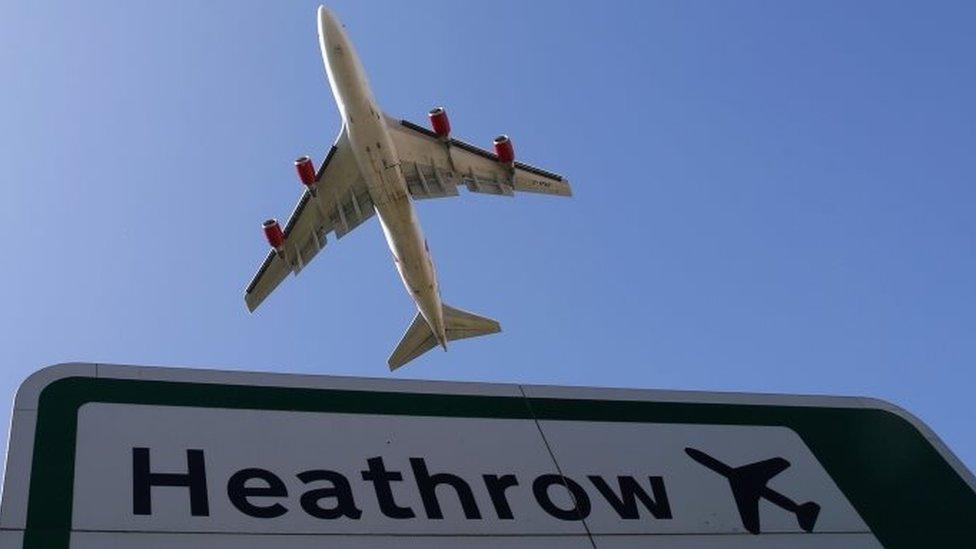
Heathrow wants to open a third runway by the middle of the next decade
The Labour MEP Sion Simon tweeted this week that over the past year £1,943 had been spent on transport per head of the population in London, compared with a Midlands total of just £254 per head. Mr Grayling tells us enlarging Heathrow will create 100,000 new jobs which would give a genuine boost to the UK economy as whole in which we all share.
And of course there is the over-arching argument that it would not be in our national interest for Heathrow to fall behind other global hubs like Dubai, Amsterdam, Frankfurt and Paris.
London is where the big money is. So enabling it to thrive, post-Brexit, as one of the world's greatest cities will enable it to remain the UK's greatest asset in business and tourism.
What does it matter if the Midlands is flown-over, not into, when HS2 can ride to the rescue?
These will be among our talking points on this weekend's Sunday Politics Midlands when I'll be joined in the studio by the former International Trade Minister, the Conservative MP for Wyre Forest, Mark Garnier; and by the former Shadow Transport Minister, Lord, formerly Peter, Snape, for more than 25 years the Labour MP for West Bromwich East.
And I hope you will join us too, at 11.00 BST on BBC One this Sunday 1 July 2018.
- Published26 June 2018
